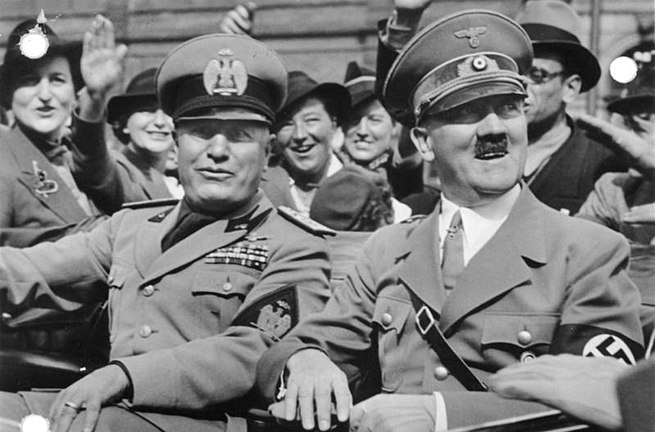Main Difference
The main difference between Fascism and Communism is that the Fascism is a form of radical authoritarian nationalism and Communism is a socialist political movement and ideology.
-
Fascism
Fascism () is a form of radical authoritarian ultranationalism, characterized by dictatorial power, forcible suppression of opposition and strong regimentation of society and of the economy, which came to prominence in early 20th-century Europe. The first fascist movements emerged in Italy during World War I before it spread to other European countries. Opposed to liberalism, Marxism and anarchism, fascism is placed on the far-right within the traditional left–right spectrum.Fascists saw World War I as a revolution that brought massive changes to the nature of war, society, the state and technology. The advent of total war and the total mass mobilization of society had broken down the distinction between civilians and combatants. A “military citizenship” arose in which all citizens were involved with the military in some manner during the war. The war had resulted in the rise of a powerful state capable of mobilizing millions of people to serve on the front lines and providing economic production and logistics to support them, as well as having unprecedented authority to intervene in the lives of citizens.Fascists believe that liberal democracy is obsolete and they regard the complete mobilization of society under a totalitarian one-party state as necessary to prepare a nation for armed conflict and to respond effectively to economic difficulties. Such a state is led by a strong leader—such as a dictator and a martial government composed of the members of the governing fascist party—to forge national unity and maintain a stable and orderly society. Fascism rejects assertions that violence is automatically negative in nature and views political violence, war and imperialism as means that can achieve national rejuvenation. Fascists advocate a mixed economy, with the principal goal of achieving autarky (national economic self-sufficiency) through protectionist and interventionist economic policies.Since the end of World War II in 1945, few parties have openly described themselves as fascist and the term is instead now usually used pejoratively by political opponents. The descriptions neo-fascist or post-fascist are sometimes applied more formally to describe parties of the far-right with ideologies similar to, or rooted in, 20th-century fascist movements.
-
Communism
In political and social sciences, communism (from Latin communis, “common, universal”) is the philosophical, social, political, and economic ideology and movement whose ultimate goal is the establishment of the communist society, which is a socioeconomic order structured upon the common ownership of the means of production and the absence of social classes, money, and the state.Communism includes a variety of schools of thought, which broadly include Marxism and anarchism (anarcho-communism), as well as the political ideologies grouped around both. All of these share the analysis that the current order of society stems from its economic system, capitalism; that in this system there are two major social classes; that conflict between these two classes is the root of all problems in society; and that this situation will ultimately be resolved through a social revolution.
The two classes are the working class—who must work to survive and who make up the majority within society—and the capitalist class—a minority who derives profit from employing the working class through private ownership of the means of production.
The revolution will put the working class in power and in turn establish social ownership of the means of production, which according to this analysis is the primary element in the transformation of society towards communism.
Critics of communism can be roughly divided into those concerning themselves with the practical aspects of 20th century communist states and those concerning themselves with communist principles and theory.
-
Fascism (noun)
A political regime, having totalitarian aspirations, ideologically based on a relationship between business and the centralized government, business-and-government control of the marketplace, repression of criticism or opposition, a leader cult and exalting the state and/or religion above individual rights.
-
Fascism (noun)
Any system of strong autocracy or oligarchy usually to the extent of bending and breaking the law, race-baiting and violence against largely unarmed populations.
-
Communism (noun)
Any advocating holding the resources collectively.
“aspheterism|q1=dated, rare”
-
Communism (noun)
Any political social system that implements a communist political philosophy.
-
Communism (noun)
The international socialist society where classes, money, and the state no longer exist.
-
Fascism (noun)
an authoritarian and nationalistic right-wing system of government and social organization.
-
Fascism (noun)
(in general use) extreme authoritarian, oppressive, or intolerant views or practices
“this is yet another example of health fascism in action”

